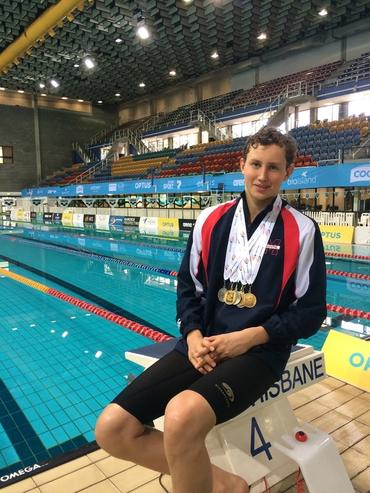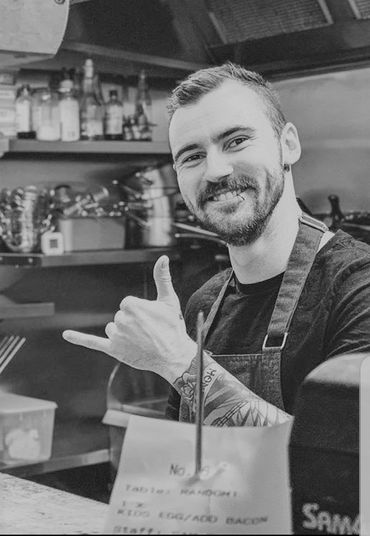My Story, Growing up Deaf- Tayla Percy
Tayla is studying her Bachelors of Youth Work and aspires to be an advocate and role model to other Deaf people.
Hi I'm Tayla. My sign name is TP.
Do you identify as Deaf or Hard of Hearing? Tell us about your diagnosis as a child?
I identify as Deaf but in the past have been labelled as Hard of Hearing. I was born in Auckland, New Zealand 22 years ago and when I was born with my twin sister, I was very unwell which lead to doing a hearing test which failed several times. But I didn’t do a hearing test until around 2-3 months old, my parents realised that I wasn’t responding to loud noises compared to my sister who would get upset and cry where I just continued playing or doing what I was doing. I was diagnosed with a severe-profound hearing loss along with ANSD Auditory Neuropathy Spectrum Disorder which is where the pathway to the hearing nerve somewhere in the inner cochlea has been damaged. My doctors told my parents that I would never live a “normal” life, I wouldn’t speak, have a job, friends and more.
If and what age were you fitted with a hearing aid or cochlear implant and what was that like?
I was fitted with hearing aids in both ears when I was 5 months old so very young. I liked having hearing aids, as it was a comfortable level of hearing, the different coloured moulds and standing out. Then across the years into my teenage years, it got worse, then my parents decide to get me a Cochlear implant on my right ear due to constant ear infections and tissues in my ear being damaged. Then I never looked back until sometime last year 2020, I didn’t have a choice with my left ear as it was only getting worse, my doctor said would I rather be on ear drops for the rest of my life or have another CI, so I decided on the CI and now I have double CI. Now I only wear my right CI because it’s comfortable for me, but I do occasionally wear my left when I really struggle in loud backgrounds.
Are you oral and if so, what was your experience like learning spoken language?
I am oral when I want to be, most the majority of the time I am using Auslan. As soon as I got fitted with hearing aids at 5 months to 18 years old, I had speech therapists every week, practising speech, sentences and words. I did enjoy it at first but then it was the constant teasing from my family or friends if I didn’t pronounce words properly, people told me I sounded funny or weird But eventually I stopped, because I was fluent in both Auslan and spoken English.
Do you use Auslan or lipread, what age did you begin learning?
I’ve always taught myself how to lipread from pretty much a very young age, I can read lips through windows, from conversations a few feet from me and without my CI. My parents were thoroughly shocked how good I could lipread and it wasn’t until I was in my early teenage years when I discovered how awesome it was and other Deaf/HOH people can do what I can do. I first witnessed Auslan around grade 4 or 5 at my primary school in lunch time Auslan club, I learned the alphabet, numbers, songs and etc. But when I got to high school, I was socialising with Deaf people who used Auslan in their every day lives, it changed my life completely and after my first day of high school, I never looked back.
How do you communicate within your family and amongst friends?
I communicate with my family is spoken English but my sister does know a lot of Auslan signs due to learning Auslan with me since we are twins and very close. My mother is currently learning a little bit of Auslan signs, the alphabet, fingerspelling and numbers. With my friends, I have both hearing and Deaf/HOH friends, mainly speak with my hearing friends and some HOH friends, but majority of the time, I do sign with my Deaf mates.
Tell us about going to school - what was that like? Did you have any help/ or assistance throughout your education?
I’ve always gone to schools from kinder, primary and secondary school with a Deaf facility, mainstream and other supports. I had Teachers of the Deaf all the way through, one-on-one class support, Deaf facility classes during a subject I didn’t do, speech therapists, sometimes a visiting teacher and during high school Auslan interpreters.
What hobbies do you have? Did you play a sport- tell us about it?
When I was younger, you’d always find me on the computer drawing, playing games, very into arts and crafts, basketball and volleyball, then when I got older, I got into Ten Pin Bowling league, I was the only girl on the team with all boys and was very competitive. My highest score was 179. Now my hobbies include card games, board games, diamond dots, spending time with family and friends, camping and more.
Can you think of some challenges you faced at school, in public, at work or playing sport?
I have faced several challenges, if I had a $1 for all of them, I’d be rich. During school, I always got bullied for my different coloured hearing aids and my Deaf accent but I wanted to stand out, be different but people made me feel small. Even out in public, people would notice my colourful hearing aids, ask me and my parents questions, feel sorry for me and say “Oh she sounds weird”. At my old work, I would always cover my Cochlear Implant because I didn’t want people to think I’m different, but my customers didn’t really seem to notice my accent. Now that I’ve embraced my differences, I don’t really care who sees my Cochlear or hear my Deaf accent, it’s my story and journey. I like being different and I wouldn’t change who I am for anyone. Now when people see me signing with my friends or in the Deaf community, people will always stare and sometimes they do approach me or they watch from a distance.
What advice can you give young deaf and hard of hearing people who might be experiencing similar challenges?
My advice would be to be proud of your Deaf identity, embrace your hearing aids/cochlear implant and Auslan. If people cringe at you, it’s because they’re jealous and want to be different like you. Do what makes you happy, know who you are and be confident in that. Don’t change for them, not worth it trying to fit in or blend in, everyone is on their own journey and we all have unique personalities.
Tell us about some of your dreams and future ambitions.
My dream would be to give back to the Deaf community, for young people to have role models and mentors they can look up to, advocate for the Deaf community further and help others in need with mental health, families and other areas too. Hopefully in 2025, I will have completed my Bachelor in Youth Work and go on to help other Deaf and HOH people. I want people to remember my hard work and recognise that you don’t have to be born into a Deaf family to achieve status, anyone with a hearing loss can be a part of the Deaf community.
From your point of view, what key message would you give parents who are starting out their journey with a deaf/hard of hearing child?
First, love the baby for who they are, their hearing loss is just a journey that the family will figure out together. Do what you think is best for the child, give them options, you can teach them Auslan, to speak or do both and if the child grows up to be older, they can decide whether they want hearing aids or cochlear implants. There are many choices, make sure to explore all the choices before deciding on one, but they will still be your baby, your creation and it’s what you teach them, that’s what matters, to teach them to love everyone no matter the disability or condition they have.



